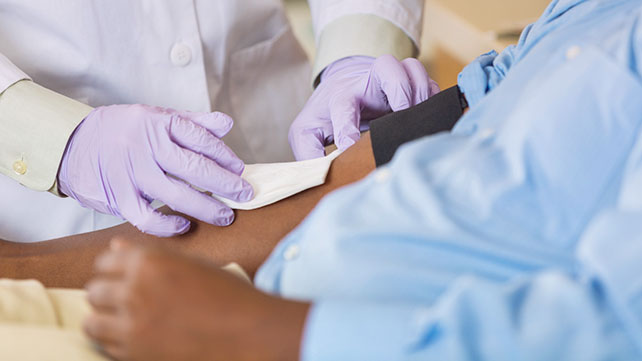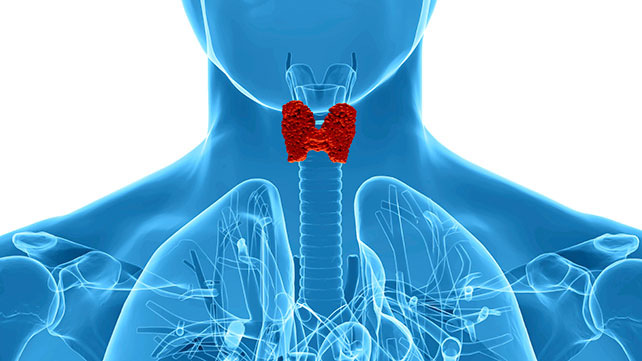
The thyroid is an important gland, and problems with this gland may be more common than you think: More than 12 percent of the U.S. population will develop thyroid disease during their lifetime. This disease can affect anyone at any age, including children and newborns.
Causes of Hypothyroidism in Children
The most common cause of hypothyroidism in children is a family history of the disease. Children whose parents, grandparents, or siblings have hypothyroidism are at a higher risk for thyroid disease. This is also true if there’s a family history of immune problems that impact the thyroid.
Autoimmune conditions, such as Graves’ disease or Hashimoto’s thyroiditis, more commonly appear during puberty. These thyroid conditions more frequently affect girls than boys.
Other common causes of hypothyroidism in children include:
- not enough iodine in a child’s diet
- being born with a nonfunctional thyroid or without a thyroid gland (also called congenital hypothyroidism)
- improper treatment of a mother’s thyroid disease during pregnancy
- abnormal pituitary gland
Symptoms of Hypothyroidism in Children
Newborns
Hypothyroidism occurs at any age, but the symptoms vary in children. In newborns, symptoms occur in the first few weeks or months after birth. The symptoms are subtle and can be missed by parents and doctors. Symptoms include:
- yellowing of the skin and whites of the eyes
- constipation
- poor feeding
- cold skin
- decreased crying
- loud breathing
- sleeping more often/decreased activity
- larger soft spot on the head
- a large tongue
Toddlers and Gradeschoolers
The problems associated with hypothyroidism beginning in early childhood vary depending on the child’s age. Thyroid conditions in young children may appear as:
- shorter than average height
- shorter than average limbs
- permanent teeth that develop later
- puberty that starts later
- slowed mental development
- heart rate that is slower than average
- hair may be brittle
- facial features may be puffy
These are the most frequent adult thyroid symptoms to appear in children:
- tiredness
- constipation
- dry skin
Teens
Hypothyroidism in teenagers occurs more often in girls than boys, and it’s most commonly due to the autoimmune disease, Hashimoto’s thyroiditis. Teenagers with a family history of autoimmune diseases, such as Hashimoto’s thyroiditis, Graves’ disease, or type 1 diabetes are at a higher risk for developing thyroid disease. Children with genetic disorders such as Down syndrome also have an increased risk for thyroid disease.
Symptoms in teens resemble those in adults. But, the symptoms can be vague and hard to recognize. Teenagers with hypothyroidism often experience the following physical symptoms:
- weight gain
- slowed growth
- being shorter in height
- looking younger than age
- slowed breast development
- later start to period
- heavy or irregular menstrual bleeding
- increased testicular size in boys
- delayed puberty
- dry skin
- brittle hair and nails
- constipation
- puffiness in face, hoarse voice, larger thyroid gland
- muscle and joint pain and stiffness
Teenagers with hypothyroidism may also have changes in behavior that are less obvious. Those symptoms include:
- tiredness
- forgetfulness
- mood or behavior problems
- difficulties with school performance
- depressed mood
- trouble concentrating
Diagnosis and Treatment of Hypothyroidism in Children
Diagnosis
Your doctor will decide on the best way to diagnose your child depending on their age and other factors. Generally, a physical exam and specific diagnostic testing can confirm the diagnosis. The diagnostic testing might involve blood tests that measure certain hormones like thyroid-stimulating hormone TSH or thyroxine, or imaging tests. About 1 out of every 4,000 babies is diagnosed with congenital hypothyroidism.
An enlarged thyroid, known as goiter, can cause problems with breathing and swallowing. Your child’s doctor will check for this problem by feeling their neck.
Treatment
There are different treatment options for hypothyroidism. Treatment typically involves daily thyroid hormone therapy with a medication called levothyroxine (Synthroid). The dose will be determined by your doctor and dependent on various factors like the age of your child.
Treatment for a newborn with thyroid disease is more successful when started within the child’s first month of life. If left untreated, low thyroid hormones can lead to problems with the nervous system or developmental delays. However, doctors regularly screen babies within the first four weeks of life, so these problems don’t usually occur.
The Takeaway
Having less than normal thyroid function is a common problem and is easily tested and treated. The treatment for hypothyroidism is life-long, but your child will lead a normal life.
Read more in Hypothyroidism ResourcesFisher, D. (2005, June). Next generation newborn screening for congenital hypothyroidism? The Journal of Clinical Endocrinology & Metabolism, 90(6), 3797-3799. Retrieved from http://www.ncbi.nlm.nih.gov/pubmed/15917488
General information/press room: Prevalence and impact of thyroid disease. (n.d.). Retrieved from http://www.thyroid.org/media-main/about-hypothyroidism/
Hypothyroidism in children. (n.d.). Retrieved from https://www.urmc.rochester.edu/Encyclopedia/Content.aspx?ContentTypeID=90&ContentID=P01963
Mayo Clinic Staff. (2015, November 10). Hypothyroidism (underactive thyroid): Symptoms. Retrieved from http://www.mayoclinic.org/diseases-conditions/hypothyroidism/symptoms-causes/dxc-20155382
Nandi-Munshi, D. & Taplin, C.E. (2014, December 31). Thyroid-related neurological disorders and complications in children. Pediatric Neurology, 52(4), 373-82. Retrieved from http://www.ncbi.nlm.nih.gov/pubmed/25661286
Rastogi, M. V., & LaFranchi, S. H. (2010). Congenital hypothyroidism. Orphanet Journal of Rare Diseases, 5, 17. Retrieved from http://www.ncbi.nlm.nih.gov/pmc/articles/PMC2903524/
Thyroid disorders. (n.d.). Retrieved from http://kidshealth.org/kid/health_problems/glandshoromones/thyroid.html#



